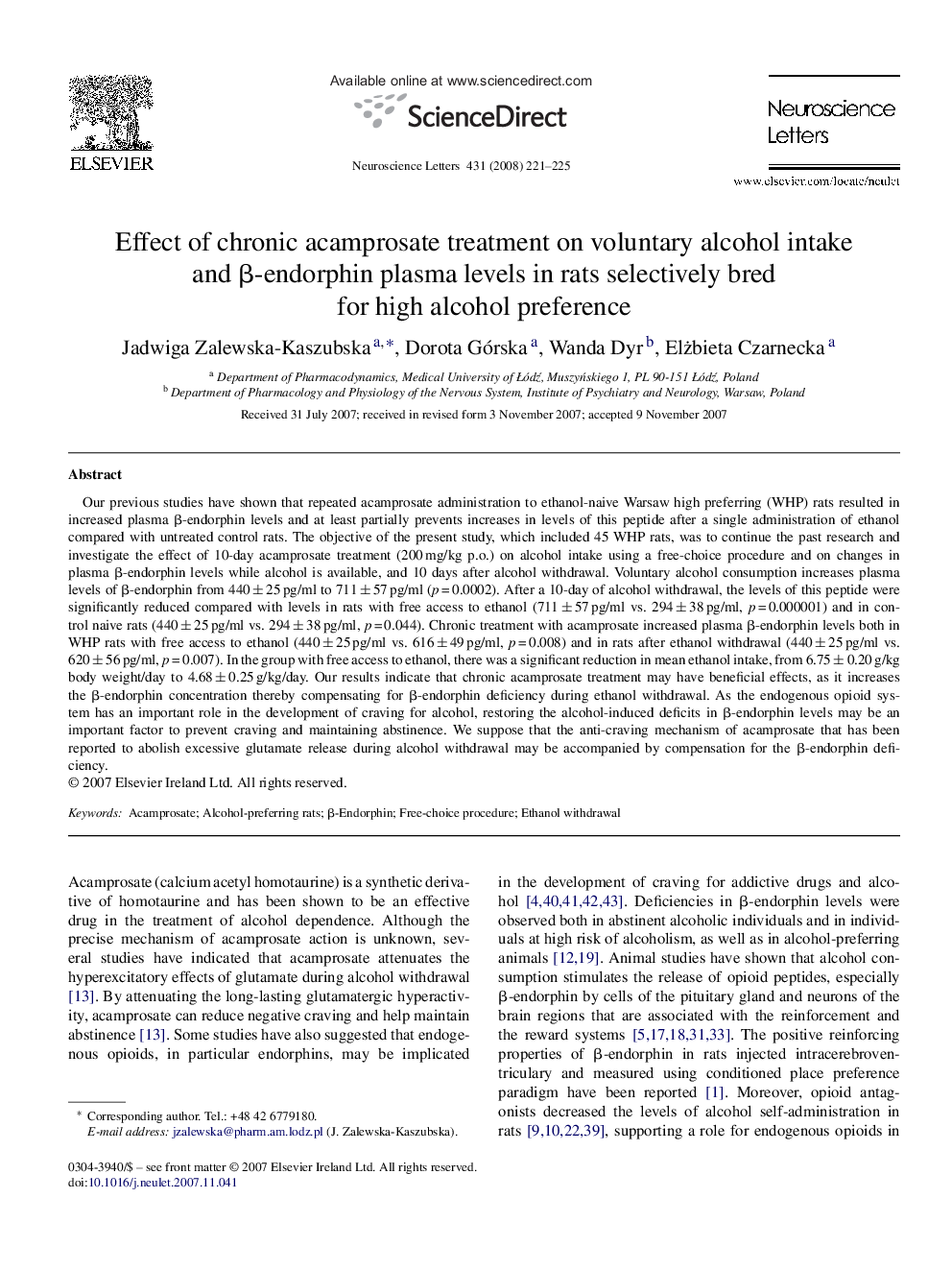| کد مقاله | کد نشریه | سال انتشار | مقاله انگلیسی | نسخه تمام متن |
|---|---|---|---|---|
| 6285864 | 1296908 | 2008 | 5 صفحه PDF | دانلود رایگان |
عنوان انگلیسی مقاله ISI
Effect of chronic acamprosate treatment on voluntary alcohol intake and β-endorphin plasma levels in rats selectively bred for high alcohol preference
دانلود مقاله + سفارش ترجمه
دانلود مقاله ISI انگلیسی
رایگان برای ایرانیان
کلمات کلیدی
موضوعات مرتبط
علوم زیستی و بیوفناوری
علم عصب شناسی
علوم اعصاب (عمومی)
پیش نمایش صفحه اول مقاله

چکیده انگلیسی
Our previous studies have shown that repeated acamprosate administration to ethanol-naive Warsaw high preferring (WHP) rats resulted in increased plasma β-endorphin levels and at least partially prevents increases in levels of this peptide after a single administration of ethanol compared with untreated control rats. The objective of the present study, which included 45 WHP rats, was to continue the past research and investigate the effect of 10-day acamprosate treatment (200 mg/kg p.o.) on alcohol intake using a free-choice procedure and on changes in plasma β-endorphin levels while alcohol is available, and 10 days after alcohol withdrawal. Voluntary alcohol consumption increases plasma levels of β-endorphin from 440 ± 25 pg/ml to 711 ± 57 pg/ml (p = 0.0002). After a 10-day of alcohol withdrawal, the levels of this peptide were significantly reduced compared with levels in rats with free access to ethanol (711 ± 57 pg/ml vs. 294 ± 38 pg/ml, p = 0.000001) and in control naive rats (440 ± 25 pg/ml vs. 294 ± 38 pg/ml, p = 0.044). Chronic treatment with acamprosate increased plasma β-endorphin levels both in WHP rats with free access to ethanol (440 ± 25 pg/ml vs. 616 ± 49 pg/ml, p = 0.008) and in rats after ethanol withdrawal (440 ± 25 pg/ml vs. 620 ± 56 pg/ml, p = 0.007). In the group with free access to ethanol, there was a significant reduction in mean ethanol intake, from 6.75 ± 0.20 g/kg body weight/day to 4.68 ± 0.25 g/kg/day. Our results indicate that chronic acamprosate treatment may have beneficial effects, as it increases the β-endorphin concentration thereby compensating for β-endorphin deficiency during ethanol withdrawal. As the endogenous opioid system has an important role in the development of craving for alcohol, restoring the alcohol-induced deficits in β-endorphin levels may be an important factor to prevent craving and maintaining abstinence. We suppose that the anti-craving mechanism of acamprosate that has been reported to abolish excessive glutamate release during alcohol withdrawal may be accompanied by compensation for the β-endorphin deficiency.
ناشر
Database: Elsevier - ScienceDirect (ساینس دایرکت)
Journal: Neuroscience Letters - Volume 431, Issue 3, 6 February 2008, Pages 221-225
Journal: Neuroscience Letters - Volume 431, Issue 3, 6 February 2008, Pages 221-225
نویسندگان
Jadwiga Zalewska-Kaszubska, Dorota Górska, Wanda Dyr, Elżbieta Czarnecka,